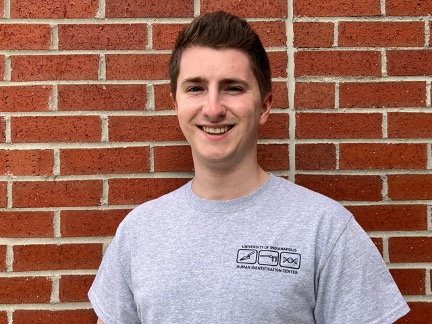
Austin Lorynski
- Expert Role: Rookie
- Major: Human Biology
- Class: Graduate Student
- Hometown: Burlington, New Jersey
Why is this humanitarian work important to you?
After watching the “Missing in Brooks County” documentary and learning more about the Beyond Borders Humanitarian trip from my colleagues and professors, I was deeply saddened by this crisis. My heart breaks for the families of the missing who wish to be reunited with their loved ones, many who end up suffering from their journey across the formidable terrain. I could not bear the thought of my parents living day to day without the knowledge of my whereabouts and if I was alive or not. I am truly blessed to be in a place with access to food, shelter, family, and an education. I have a life that many take for granted. I believe the world needs more compassionate individuals who chose to do difficult things, not for the recognition, but because these acts benefit humanity. As a Christian, if I am given the opportunity to help others, then I must.
What do you hope to gain from this experience?
From this trip, I hope to gain a new perspective on the migrant crisis at the border. I have never been involved in a humanitarian effort to this extent before. I want to learn about how our efforts directly help the situation and what life is really like for those who are struggling. I also want to learn how to conduct proper field searches, a skill that will benefit my career in the future. Finally, I wish to practice my teamwork and communication skills, because these skills add to the success of the team.
What are some of the biggest challenges you will face while in Texas?
I fully expect this trip to be physically and emotionally taxing. I have never been to Texas and I am not acclimated to the type of environment we will be working in. I have also never been a part of a traditional field recovery. Although I feel inexperienced, I will be traveling with a team composed of my director and other trusted colleagues who have done this work before. I am confident they will prepare me so I can perform to the best of my abilities. Also, I know I will be subjected to many stressful situations where I must maintain composure in overwhelming circumstances.
What’s one thing people probably don’t know about you until they’ve known you a long time?
Although I like to joke around a lot and make people laugh, most people would probably not know that I am a very good listener. I value my friends and try my best to be there for them during their hardships, even if it just means having someone to talk to. When my friends are going through a rough time, I like to have long productive conversations to help them in any way I can.
When did you know you wanted to pursue human biology as a degree, and how did you become interested in forensics?
In high school my anatomy teacher was very passionate about the subject. He inspired me to want to focus my education on Human Biology. It wasn’t until my internship at the New Jersey Office of Forensic Sciences when I decided I wanted to pursue a career in forensic anthropology. My internship was based in DNA, but after meeting the anthropologist and touring her lab, I knew for the first time exactly what I wanted to study. This led to discovering UIndy’s graduate program.
What advice would you give other students interested in pursuing a human biology degree at UIndy?
My advice to future students entering our program would be to take advantage of every opportunity that is presented to you. Although two or three years may seem like a long period of time, grad school goes by in the blink of an eye. Be sure to expand your education outside of the classroom. Attend conferences to learn new things and network with new people and get involved in research to diversify your experience. You will thank yourself in the future.
In addition, my most important piece of advice would be to manage your expectations. As a grad student in the next step of your academic career it is important to set goals for yourself and work hard to achieve them. However, when we fall short of our goals or if things don’t turn out the way we expect them to, we often tend to be too critical of ourselves and let obstacles diminish our achievements. Remember that you were chosen to be here. Your intelligence and other professional qualities have made you stand out among many other applicants who want to be in your position. Do not diminish your self-worth. Once you discover your niche in the program, you will realize that you are a scholar with a unique perspective and set of skills that will allow you to contribute something to the field that no one else can.
What makes UIndy’s human biology program distinctive?
Everything that makes the UIndy Human Biology program distinctive are my favorite aspects of the program. I enjoy the fact that the program is kept rather small. This allows for a more personal approach to education between students and professors. They want you to succeed and will do everything they can to help you reach your goals if you are motivated and show initiative. I also enjoy how the program allows students to gain hands-on experience with skeletal analysis on forensic cases that come through the Human Identification Center. Finally, the curriculum focuses on human biology as the foundation for our education. I believe it is the most practical way to set up students for academic success, since biological science is such a major aspect of forensic anthropology. All of these aspects of the program are the reasons that solidified my decision to attend UIndy.